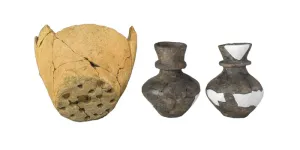(Press-News.org) Sticking closely to a Mediterranean diet cuts a woman’s risks of cardiovascular disease and death by nearly 25%, finds a pooled data analysis of the available evidence—the first of its kind—published online in the journal Heart.
The findings prompt the researchers to call for more sex specific research to guide clinical practice in heart health.
Cardiovascular disease accounts for more than a third of all deaths in women around the world. While a healthy diet is a key plank of prevention, most relevant clinical trials have included relatively few women or haven’t reported the results by sex, say the researchers.
And current guidelines on how best to lower cardiovascular disease risk don’t differentiate by sex.
To build on the evidence base to inform sex specific guidance and clinical practice, the researchers trawled research databases for studies looking at the potential impact of eating a Mediterranean diet on women’s cardiovascular health and their risk of death.
The Mediterranean diet is rich in wholegrains, vegetables, fruit, legumes, nuts, and extra virgin olive oil; moderate in fish/shellfish; low to moderate in wine; and low in red/processed meats, dairy products, animal fat, and processed foods.
From an initial haul of 190 relevant studies, the researchers included 16 published between 2003 and 2021 in their pooled data analysis.
The studies, which were mostly carried out in the US and Europe, involved more than 700,000 women aged 18 and above whose cardiovascular health was monitored for an average of 12.5 years.
The results of the analysis showed that sticking closely to a Mediterranean diet was associated with a 24% lower risk of cardiovascular disease, and a 23% lower risk of death from any cause in women.
The risk of coronary heart disease was 25% lower, while that of stroke was also lower, although not statistically significant, in those who most closely followed this diet compared with those who did so the least.
Excluding each of the studies one at a time from the analysis didn’t materially affect the findings, “further supporting a strong inverse relationship for incident [cardiovascular disease] and total mortality with higher Mediterranean diet adherence in women,” write the researchers.
They nevertheless acknowledge various limitations to their findings, including that all the studies analysed were observational and relied on self-reported food frequency questionnaires. And adjustments for potentially influential factors varied across the included studies.
But the Mediterranean diet’s antioxidant and gut microbiome effects on inflammation and cardiovascular risk factors are among the possible explanations for the observed associations, say the researchers.
And the diet’s various components, such as polyphenols, nitrates, omega-3 fatty acids, increased fibre intake and reduced glycaemic load, may all separately contribute to a better cardiovascular risk profile, they suggest.
“However, mechanisms explaining the sex specific effect of the Mediterranean diet on [cardiovascular disease] and death remain unclear,” they note, adding that the findings reinforce the need for more sex specific research in cardiology.
“Female specific cardiovascular risk factors, including premature menopause, pre-eclampsia and gestational diabetes, or female predominant risk factors, such as systemic lupus, can all independently increase [cardiovascular disease] risk,” they write.
“It is possible that preventative measures, such as a Mediterranean diet, that targets inflammation and [cardiovascular disease] risk factors, impose differing effects in women compared with men,” they add.
END
Mediterranean diet cuts women’s cardiovascular disease and death risk by nearly 25%
More sex specific research needed to guide clinical practice, say researchers
2023-03-15
ELSE PRESS RELEASES FROM THIS DATE:
High blood caffeine level might curb amount of body fat and type 2 diabetes risk
2023-03-15
A high blood caffeine level might curb the amount of body fat a person carries and their risk of type 2 diabetes, suggests research published in the open access journal BMJ Medicine.
In light of their findings, the potential role of calorie free caffeinated drinks for lowering the risks of obesity and type 2 diabetes is probably now worth exploring, say the researchers.
Previously published research indicates that drinking 3-5 daily cups of coffee, a rich source of caffeine, is associated with a lower risk ...
TikTok health information videos on Mpox often inaccurate and of poor quality
2023-03-15
Health information on M(onkey)pox, posted on the social media platform TikTok, is often inaccurate, incomplete, and of poor quality, finds a recent analysis of relevant videos, published in the open access journal BMJ Global Health.
The findings highlight the potential risks of using social media for health information, particularly during public health emergencies, warn the researchers.
Mpox, formerly called monkeypox, usually describes fever, swollen lymph glands (lymphadenopathy), and painful skin pustules all over the body ...
Altered “neuronal avalanches” in brains of epilepsy patients tied to cognitive performance
2023-03-15
New research by the Human Brain Project has found that in the brains of patients with epilepsy, changes in large scale neuronal activations can be detected in the brain’s resting state activity, even when no seizure is ongoing. The non-invasive approach could lead to a new method to aid epilepsy diagnostics.
Diagnosing epilepsy can be problematic for patients, who sometimes have to wear helmets and electrodes for prolonged periods of time waiting for an epileptic episode to happen, so that the clinicians can document it with EEG. Alternatively, the seizure is artificially induced, causing discomfort.
The new ...
Neolithic ceramics reveal dairy processing from milk of multiple species
2023-03-15
A new study has found evidence of cheesemaking, using milk from multiple animals in Late Neolithic Poland.
The research suggests that early farmers reduced the lactose content in milk by making it into cheese or other dairy products like yoghurt, and used dairy products from a number of different animals, such as cows, sheep or goats.
Lactose intolerance was a common condition in almost everyone in Europe during the Neolithic and until the Late Bronze Age when the genetic mutation became widespread, enabling adults to produce lactase, the enzyme which breaks down lactose in the body.
Researchers looked at the practice of dairy processing ...
Community health workers can help protect pregnant women and their babies from malaria
2023-03-15
Community health workers can make a great difference in increasing the number of pregnant women who receive life-saving preventive antimalarial treatment, according to a study conducted in four sub-Saharan African countries and led by the Barcelona Institute for Global Health (ISGlobal), an institution supported by “la Caixa” Foundation. The findings, published in The Lancet Global Health, will help to guide malaria control strategies in pregnant women and improve maternal and infant health in malaria-endemic ...
Robots can help improve mental wellbeing at work – as long as they look right
2023-03-15
Robots can be useful as mental wellbeing coaches in the workplace – but perception of their effectiveness depends in large part on what the robot looks like.
Researchers from the University of Cambridge carried out a study in a tech consultancy firm using two different robot wellbeing coaches, where 26 employees participated in weekly robot-led wellbeing sessions for four weeks. Although the robots had identical voices, facial expressions, and scripts for the sessions, the robots’ physical appearance affected how participants interacted with it.
Participants who did their wellbeing exercises with a toy-like robot said that they felt more of a connection ...
Knowing your ants from your anteaters: are wildlife documentaries showing us the ‘real’ natural world?
2023-03-15
Wildlife documentaries miss an opportunity to highlight the diversity of nature by focusing too much on mammals and birds, according to a new study.
In a new study published in People and Nature, researchers from the University of Cambridge have shown that while the production of wildlife documentaries has exploded over recent decades, they portray a biased view of the natural world around us.
Our natural world is under threat, from habitat and biodiversity loss, to high extinction rates. At the same time, there is a growing disconnect between people and nature, with children’s opportunities to experience the natural world diminishing.
Now more ...
Propeller advance paves way for quiet, efficient electric aviation
2023-03-15
Electrification is seen as having an important role to play in the fossil-free aviation of tomorrow. But electric aviation is battling a trade-off dilemma: the more energy-efficient an electric aircraft is, the noisier it gets. Now, researchers at Chalmers University of Technology, Sweden, have developed a propeller design optimisation method that paves the way for quiet, efficient electric aviation.
In recent years, electrification has been described as having an important role in reducing emissions from future aviation. Due to the challenges posed by longer ranges, interest is chiefly focused on electric propeller planes covering shorter distances. Propellers connected to ...
People of color have been largely underrepresented among authors published in the American Journal of Archaeology
2023-03-14
A new demographic survey of authorship in the American Journal of Archaeology (AJA) reveals that people of color have been largely underrepresented among the scholars published in the journal. The results of the survey, which also found that authors who are the children of people without advanced degrees were also underrepresented in the journal’s pages, are published in the paper “Demographic Dynamics of Publishing in the American Journal of Archaeology.” The study was conducted ...
Common cold gives children immunity against COVID-19
2023-03-14
During the pandemic, medical doctors and researchers noticed that children and adolescents infected with COVID-19 became less ill than adults. A possible explanation for this is that children already had a prior level of immunity to COVID-19 provided by memory T cells generated by common colds.
After studying unique blood samples from children taken before the pandemic, researchers from Karolinska Institutet in Sweden have now identified memory T cells that react to cells infected with SARS-CoV-2, the virus that causes COVID-19.
Four coronaviruses cause common colds
A possible explanation for this immunity in children is that they already had colds caused by one of the four coronaviruses ...
LAST 30 PRESS RELEASES:
The world’s largest brain research prize awarded for groundbreaking discoveries on how we sense touch and pain
Magnetofluids help to overcome challenges in left atrial appendage occlusion
Brain-clearing cells offer clues to slowing Alzheimer’s disease progression
mRNA therapy restores fertility in genetically infertile mice
Cloaked stem cells evade immune rejection in mice, pointing to a potential universal donor cell line
Growth in telemedicine has not improved mental health care access in rural areas, study finds
Pitt scientists engineer “living eye drop” to support corneal healing
Outcomes of older adults with advanced cancer who prefer quality of life vs prolonging survival
Lower music volume levels in fitness class and perceived exercise intensity
Of crocodiles, counting and conferences
AERA announces 2026 award winners in education research
Saving two lives with one fruit drop
Photonic chips advance real-time learning in spiking neural systems
Share of migratory wild animal species with declining populations despite UN treaty protections worsens from 44% to 49% in two years; 24% face extinction, up 2%
One in 20 babies experiences physical abuse, global review finds
Tundra tongue: The science behind a very cold mistake
Targeting a dangerous gut infection
Scientists successfully harvest chickpeas from “moon dirt”
Teen aggression a warning sign for faster aging later in life
Study confirms food fortification is highly cost-effective in fighting hidden hunger across 63 countries
Special issue elevates disease ecology in marine management
A kaleidoscope of cosmic collisions: the new catalogue of gravitational signals from LIGO, Virgo and KAGRA
New catalog more than doubles the number of gravitational-wave detections made by LIGO, Virgo, and KAGRA observatories
Antifibrotic drug shows promise for premature ovarian insufficiency
Altered copper metabolism is a crucial factor in inflammatory bone diseases
Real-time imaging of microplastics in the body improves understanding of health risks
Reconstructing the world’s ant diversity in 3D
UMD entomologist helps bring the world’s ant diversity to life in 3D imagery
ESA’s Mars orbiters watch solar superstorm hit the Red Planet
The secret lives of catalysts: How microscopic networks power reactions
[Press-News.org] Mediterranean diet cuts women’s cardiovascular disease and death risk by nearly 25%More sex specific research needed to guide clinical practice, say researchers


